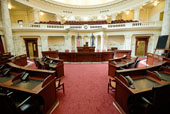 Congress created quite a bit of “busy work” for itself during the government shutdown, as a number of funding bills were proposed. Although many government-sponsored programs are considered non-essential, as it turns out smaller numbers of Americans are greatly impacted when funding from these agencies ceases. What follows is a partial list of just some of the stop-gap legislation Congress was working on before the shutdown was resolved.
Congress created quite a bit of “busy work” for itself during the government shutdown, as a number of funding bills were proposed. Although many government-sponsored programs are considered non-essential, as it turns out smaller numbers of Americans are greatly impacted when funding from these agencies ceases. What follows is a partial list of just some of the stop-gap legislation Congress was working on before the shutdown was resolved.
Continuing Appropriations Resolution, 2014 (HR 2775) – This was the “vehicle” for passage of the bill that ended the government shutdown and raised the debt ceiling. Introduced by Rep. Diane Black (R-Tenn.), this bill was passed by both the House and the Senate on Oct. 16.
Impact Aid of Continuing Appropriations Resolution (HJ Res 83) – Also known as the Impact Aid for Local Schools Act, this bill compensates local educational agencies for lost revenue that results from a lapse in federal funding due to a federal government shutdown. Introduced by Rep. Hal Rogers (R-Ky.), this program would result in budget authority of approximately $1.2 billion; never made it to a vote.
Bureau of Indian Affairs, Bureau of Indian Education, and Indian Health Services Continuing Education Appropriations Resolution (HJ Res 80) – This provides immediate funding to American Indians and Alaska Natives during a lapse in federal funding resulting from a federal government shutdown. Introduced by Rep. Mike Simpson (R-Ind.), this program would result in budget authority of approximately $6.65 billion. It was passed in the House on Oct. 14, but not the Senate.
The Border Security and Enforcement Continuing Appropriations Resolution (HJ Res 79) – Among other purposes, this bill was to make continuing appropriations for certain components of the Department of Homeland Security. Introduced by Rep. John Carter (R-Texas), this program would result in budget authority of approximately $18.8 million. It was passed in the House but never voted on in the Senate.
The National Nuclear Security Continuing Appropriations Resolution (HJ Res 76) – Provides immediate funding for certain activities of the NNSA at the same rate and under the same conditions as in effect at the end of the just completed fiscal year. Introduced by Rep. Rodney Frelinghuysen (R-N.J.), this program would result in budget authority of approximately $10.6 billion. It was passed in the House but never voted on in the Senate.
The Nuclear Regulatory Commission Continuing Appropriations Resolution (HJ Res 95) – Makes appropriations for the Nuclear Regulatory Commission (NRC) for FY2014, including civilian personnel and benefits for operations necessary to avoid furloughs. Introduced by Rep. Adam Kinzinger (R-Ill.), this bill never made it to a vote.
The Federal Worker Pay Fairness Bill (HJ Res 89) – Makes appropriations for the salaries and related expenses of certain Federal employees during a lapse in funding authority to establish a working group on deficit reduction and economic growth, and for other purposes. Introduced by Rep. Hal Rogers (R-Ky.), this bill was passed in the House but never voted on in the Senate.
The Military Chaplains Continuing Appropriations Resolution (HCon Res 58) – Permits chaplains who provide religious services to members of the Armed Forces on a contract basis to continue providing religious services during a government shutdown. Introduced by Rep. Doug Collins (R-Ga.), this authorization was agreed to by both the House and the Senate.

